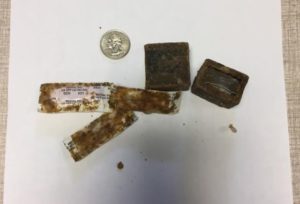 BOURNE – Efforts to keep raccoon rabies off Cape Cod continue next week with the fall distribution of oral rabies vaccination baits.
BOURNE – Efforts to keep raccoon rabies off Cape Cod continue next week with the fall distribution of oral rabies vaccination baits.
The U.S. Department of Agriculture’s Wildlife Services and Cape Cod Rabies Task Force will begin distributing 72,000 baits off Cape beginning Monday.
Bait stations will be filled and hand-baiting will be conducted in mainland Bourne and Sandwich, Wareham, Plymouth, and portions of Kingston, Carver Middleboro, Rochester and Marion.
The following week, the distribution of 36,000 baits from the canal to West Yarmouth will begin.
“We’ll be baiting in the exact same zone as we baited this past spring,” said Brian Bjorklund, a wildlife biologist with the USDA’s Wildlife Services and the coordinator of the Cape Cod Rabies program.
The first case of raccoon rabies was discovered on Cape Cod in 2004 and quickly spread all the way to Provincetown by 2006.
Bjorklund said progress has been made to push the disease further and further west.
“We haven’t had a case of raccoon variant rabies east of the canal since 2013 in Barnstable,” Bjorklund said. “We’ve been maintaining the bait distribution to vaccinate those raccoons and other rabies vectors.”
There has not been a case of raccoon rabies east of Yarmouth since 2008.
Baiting west of the canal started again in the spring of 2016. The area had not been baited before last spring since 2003.
Anyone that finds a rabies vaccine or bait package is asked to use a glove or towel to pick it up and toss it into the woods where children and pets can’t get to it. If there is no suitable wooded area to put the bait, it should be disposed of in the trash.
“The baits are not harmful to people or pets, generally,” Bjorklund said. “If a pet were to consume a bait, the worst that we’ve seen is an upset stomach from the richness and fattiness of the fishmeal coating.”
Hands should be washed thoroughly after a bait is handled.
If a pet has eaten or had contact with a bait is should be reported to the Department of Public Health at 617-983-6800. The reported information is used to let those who distributing the baits know that the baits may have not reached their targeted area.























